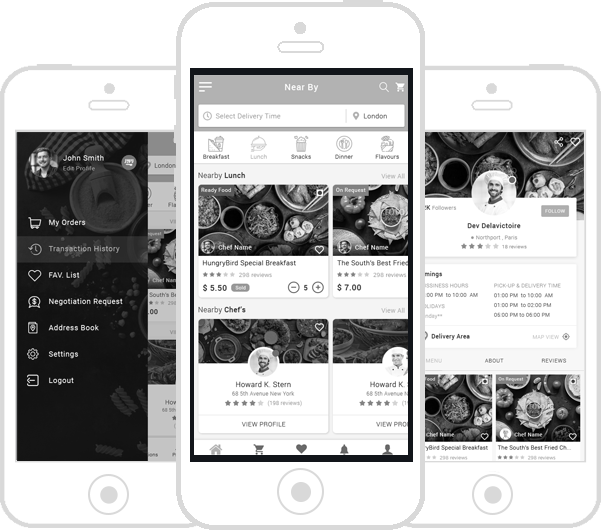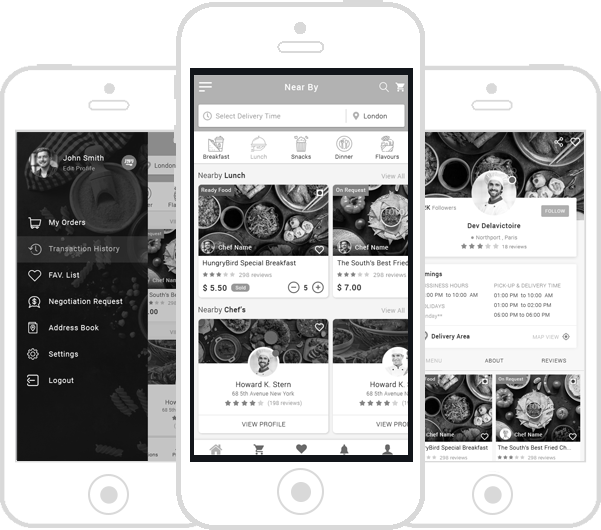Taxi app development company in Saudi Arabia
The first step for a reputable Saudi Arabian taxi app development business is usually to comprehend the particular prospects and problems that exist in the regional transportation industry. To determine customer preferences, legal frameworks, and operational factors that affect taxi services, they carry out in-depth market research. Equipped with this understanding, they formulate and create custom solutions to tackle these complexities, guaranteeing that the applications they create are not only useful but also appealing to the intended user base.
Additionally, a respectable taxi app development business sets itself apart with its all-encompassing strategy for client assistance and collaboration. They collaborate closely with stakeholders to refine concepts, take input into account, and provide specialized solutions that go above and beyond from ideation to deployment. By putting the needs of the client first, they create long-lasting relationships and guarantee that every taxi app they create demonstrates their dedication to excellence and innovation. These businesses also ensure that their clients' taxi applications stay competitive in a fast changing digital world by offering ongoing maintenance and updates.
Why Choose Us for Taxi app development company in Saudi Arabia?
Taxi App Development Experience
We've developed dependable and expandable taxi booking app development company applications in the past. Our staff has expertise creating backend systems that are effective and guarantee seamless operations, as well as user-friendly interfaces.
Local Market Knowledge
With our headquarters in Saudi Arabia, we are well-versed in the laws, customs, and dynamics of the local market. This enables us to custom modify the taxi app to satisfy the requirements of Saudi Arabian users.
Flexibility and Customization
We provide incredibly adaptable solutions that may be adapted to your unique set of business needs. Whether you operate a cab service from a startup or are an established company, we can modify our technology to meet your requirements.
Dependability and Quality
We place a high priority on quality throughout the whole development process. We make sure that the taxi app satisfies the highest requirements for performance and dependability from the very beginning of its creation to its deployment and upkeep.
Support and Upkeep
Our collaboration with clients goes beyond the design stage. To make sure your taxi app always functions properly, we offer continuous support and maintenance services.
Innovation and Technology Stack
We keep abreast of the most recent developments in the taxi app market. Our developers are adept at coming up with creative solutions that provide you a competitive edge using cutting-edge tech stacks.
Cost-Effective Solutions
We provide economical solutions without sacrificing excellence. Our objective is to maximize development processes and resources in order to provide value for the money.
Client-Centric Approach
We put the needs of our clients first and work to establish enduring relationships. We make sure that your feedback is valued at every stage of the development process with our collaborative approach.
Your choice of weapon
Build your Apps for any Platform
Our Taxi app development company in Saudi Arabia Include

iOS App Development
Our Saudi Arabian iOS app development services make sure your taxi app is unique on Apple products and offers a smooth, functional user experience. Utilizing state-of-the-art tools and technologies, we develop safe, scalable applications tailored to the needs of iOS users, increasing user pleasure and engagement.

Android App Development
Your taxi app may use Android devices to reach a large audience in Saudi Arabia thanks to our experience with Android app development. Our primary goal is to develop applications that are compatible with a large variety of Android devices and optimized for speed, usability, and performance. We make sure your software satisfies the highest requirements, from user-friendly interfaces to effective backend systems.

Cross-Platform Development
With our cross-platform development services, you may increase the app's user base and save development expenses. We create native-like experiences that function flawlessly on both the iOS and Android platforms by utilizing frameworks like React Native and Flutter. This method shortens time-to-market without sacrificing the functionality and quality of the software on several platforms.

Enterprise Mobility Solutions
Our enterprise mobility solutions offer customized applications that seamlessly interface with your current systems, making them ideal for taxi businesses seeking to improve customer service and streamline operations. We provide your company with technology that promotes efficiency and expansion, from real-time tracking and dispatching to client feedback and analytics.
Taxi app development company in Saudi Arabia
Market Research
Recognize consumer trends, the competitive landscape, and local market demand. The need for transportation services is rising in Saudi Arabia, particularly in the country's largest cities, Riyadh, Jeddah, and Dammam.
Legal and Regulatory Compliance
Learn about the local laws that control the technology and transportation industries. Ensure your app complies with licensing, driver requirements, and data protection policies.
Technology Stack
When developing an app, pick a reliable technology stack. Consider payment gateways, scalability, real-time tracking, and interoperability with different mobile platforms (iOS, Android).
User Interface and Experience
Create an interface that is simple to use and intuitive for both drivers and passengers. Include features like real-time tracking, fare calculation, secure payment methods, and ratings and reviews.
Recruitment and Training of Drivers
Establish a process for hiring drivers that includes background checks and training. Ensure compliance with local transportation laws.
Payment Systems
Include secure payment mechanisms (cash, credit cards, digital wallets like STC Pay or MADA) tailored to local preferences.
Marketing and Promotion
Create a strategy to attract drivers and passengers. Utilize promotions, collaborations with local businesses, and digital marketing to gain traction.
Customer Service
Set up an efficient customer service system to promptly address inquiries from drivers and passengers. Consider providing multilingual support in a diverse market like Saudi Arabia.
Collaborations and Partnerships
Consider forming partnerships with local businesses, hotels, and airports to enhance service visibility and accessibility.
Testing and Release
Before releasing the app to the public, ensure thorough testing across various devices and scenarios to ensure smooth functionality.
Adaptation to Local Culture
Be mindful of local customs and cultural nuances when designing the app, creating marketing materials, and interacting with customers.
Constant Improvement
Solicit feedback from drivers and users to continually enhance the app's features and services.


iOS Taxi app development company in Saudi Arabia
Planning and Market Research:
-
Determine Your Target Audience:
Learn about the characteristics and inclinations of Saudi Arabian cab passengers.
-
Analyze competitors:
Look at the taxi apps that are currently available in the area to find potential and gaps.
-
Regulatory Requirements:
Learn about the laws and rules pertaining to municipal transportation, particularly those pertaining to licenses and permits.
Establishing a Business:
-
Legal Aspects:
Make sure your company complies with Saudi Arabian legislation by forming a legal organization.
-
Partnerships:
To make operations easier, think about forming alliances with nearby cab firms or drivers.
Development of Apps:
-
Platform Selection:
Considering the prevalence of iOS among Saudi Arabian smartphone users, select it as your main platform.
-
Feature Set:
Create features that are tailored to the needs of the regional market, like support for both Arabic and English as preferred languages, safe payment methods, and interaction with regional mapping and navigation systems.
Infrastructure Technical:
-
Server Configuration:
To manage reservations, payments, and alerts in real time, set up a strong server architecture.
-
Payment Integration:
Make sure local financial laws are followed while integrating regional payment gateways.
-
Security:
To safeguard user information and transactions, put strict security measures in place.
Promotion and Announcement:
-
Brand Awareness:
Using social media, digital marketing, and partnerships, establish a powerful online presence for your brand.
-
Launch Plan:
Consider a phased implementation, beginning in Saudi Arabia's most important cities or areas.
-
Customer service:
Offer thorough customer service channels to handle questions and problems from users.
Upkeep & Updates:
-
Feedback Loop:
Get input from users and make ongoing improvements to the app based on their recommendations and industry developments.
-
Technical Support:
Make sure the app receives regular upgrades and maintenance to maintain it safe and functional.
Adjustment to Regional Culture:
-
Localization:
Modify the software to reflect customs, holidays, and cultural norms in the area.
-
Customer service:
Given that the populace is bilingual, provide customer assistance in both Arabic and English.
Android Taxi app development company in Saudi Arabia
Describe the features and requirements:
-
Select essential features such as driver administration, ratings, payment integration, tracking, and booking.
-
Take into account Saudi-specific needs such regional payment gateways, Arabic language support, and cultural customs.
Select a Development Strategy:
-
Choose if you want to hire a development company or build the app internally.
-
Analyze the benefits and drawbacks of each strategy in light of your resources, schedule, and level of experience.
Locate a Development Firm:
-
Seek out Saudi Arabian app development firms with a focus on Android app development and expertise in taxi app solutions.
-
Examine their past work, testimonials from clients, and experience with related projects.
Planning and Implementation:
-
Collaborate closely with the development team to produce UI/UX designs and wireframes.
-
Agile development techniques should be used to ensure the app's adaptability and change-responsiveness.
Testing:
-
To make sure the app functions smoothly on a variety of devices and in a range of scenarios, thoroughly test it.
-
Check for compatibility, speed, security, and usability.
Implementation:
-
Install the app from the Google Play Store, making sure you follow all the rules and regulations that are required.
-
Create marketing plans and collateral to help spread the word about the app.
Upkeep & Updates:
-
To keep the app safe and current with the newest Android features and versions, budget for regular maintenance and updates.
-
To make constant improvements to the software, keep an eye on analytics and user input.


React Native Taxi app development company in Saudi Arabia
Analysis and Research on the Market
-
Recognizing the intended audience: Determine the Saudi Arabian-specific user demographics, preferences, and behaviors.
-
Analyze competitors: Look at the taxi apps that are currently available in the area to find potential and gaps.
Planning and Conceptualization
-
Define elements: Real-time tracking, fare calculation, payment integration, ratings and reviews, and language support (with Arabic being very important in Saudi Arabia) are all essential elements.
-
Tech Stack: To ensure cross-platform development that works with both iOS and Android, pick React Native.
Sketching and Modeling
-
UI/UX Design: Make an interface that is easy to use, emphasizing accessibility and simplicity while taking Saudi Arabian usability standards and cultural preferences into account.
-
Prototyping: To see the functionality and flow of the app, create interactive prototypes and wireframes.
Progress
-
Frontend Development: To ensure responsiveness and seamless performance, implement the UI design using React Native components.
-
Backend Development: Configure databases, servers, and APIs to provide features like ride matching, payment processing, and user administration.
-
Integration: Include third-party services for payment gateways (like PayPal and Stripe), communication (like Twilio for SMS notifications), and mapping (like Google Maps and Here Maps).
Quality Control and Testing
-
Testing: Make sure all aspects of functionality, usability, security, and performance are thoroughly tested.
-
Localization testing: Verify that all aspects of the app—text direction, layout, and cultural appropriateness—function flawlessly in Arabic.
Deployment and Launch
-
App Store Submission: Adhere to the Google Play Store and iOS App Store submission criteria.
-
Marketing: Create a plan to market the app locally by utilizing digital platforms and forming alliances with nearby companies.
Post-Launch Support
-
Monitoring and Maintenance: To pinpoint areas that need work, keep an eye on app analytics, user reviews, and performance.
-
Updates and Improvements: Based on user input and industry trends, the app will be updated frequently with new features, security updates, and enhancements.
Saudi Arabia's Regulations to Take Into Account
-
Compliance: Make sure that all local laws pertaining to payment processing, transportation services, and data protection are followed.
-
Localization: Make the software compliant with regional laws and practices, especially those pertaining to payment policies and user data protection.
Cross platform Taxi app development company in Saudi Arabia
Market Research:
Recognize the needs and preferences of the regional market. Examine current taxi services to find any weaknesses or areas that could be improvement.
Legal & Regulatory Compliance:
Learn about the rules that apply locally and legally to running a cab service and managing client information in Saudi Arabia.
Technology Selection:
Selecting the right technology stack is essential for cross-platform development. Because they allow you to create code only once and have it run on numerous platforms, React Native and Flutter are popular options.
Feature Set:
Specify the functions that your taxi app will offer. These usually consist of user registration, fare computation, payment integration, driver ratings, and reviews in addition to real-time location tracking.
User Experience Design:
Create an intuitive user interface that meets the needs of both drivers and passengers through user experience design. Make sure the booking procedure, accessibility features, and navigation are simple.
Backend Development:
Construct a strong backend framework to manage user information, reservations, payments, and driver-passenger correspondence.
Payment Integration:
Include safe payment gateways that accept the regional payment options that Saudi Arabian users choose.
Localization:
Make sure the program is culturally sensitive, accommodates Arabic language users, and conforms to regional standards.
Testing and Quality Assurance:
Make sure the app runs well on a variety of platforms and devices by doing thorough testing. Focus on performance optimization and security.
Launch and Marketing:
Arrange for a well-thought-out app launch. To promote your taxi app, make use of digital marketing channels and joint ventures with nearby companies or influencers.
Customer Support:
To address consumer questions, comments, and grievances, put in place a responsive customer support system.
Iterative Improvement:
To enhance app functionality and user experience over time, continuously collect analytics and user input.

you can also reach us at our given
email address or phone number.

Our Taxi App Development Process
Requirements Analysis and Gathering
-
Market research: Gain an understanding of the Saudi Arabian taxi service market, including consumer expectations, an analysis of rivals (such as Careem and Uber), and legal requirements.
-
Client Consultation: Talk about the particular needs of the client, the company's objectives, the target market, and the required special features.
Organization and Documentation
-
Project Scope Definition: Clearly describe the features, functions, and modules of the application in the project scope definition.
-
Technology Stack Selection: Based on scalability and performance needs, select the right technologies for frontend (iOS, Android) and backend (Node.js, Django) development.
-
Architecture Design: Construct a technological architecture taking into account aspects like security, scalability, and interconnections with external systems.
Design
-
UI/UX Design: Create wireframes and prototypes for an intuitive user experience.
-
Brand Integration: Include client branding in the application's layout.
-
Feedback Loop: Get input from clients and adjust designs as necessary.
Development
-
Backend Development: Create databases, APIs, and server-side logic. Integrate these components with external services, such as payment gateways (STCPay, MADA).
-
Frontend Development: Use Kotlin and Swift to develop client-side applications for iOS and Android.
-
Testing: Perform thorough testing (unit, integration, and user acceptance testing) to ensure functionality and performance.
Implementation
-
Deployment: Make the app available on the Apple App Store and Google Play Store.
-
Server Deployment: Deploy the backend on dependable cloud servers (such as AWS and Azure) to ensure scalability and security.
-
Monitoring Configuration: Use monitoring software to track performance in real-time and address issues promptly.
Maintenance and Support
-
Bug Fixes and Updates: Provide continuous support for bug fixes and updates based on user feedback and platform updates.
-
Security Updates: Regularly apply security updates and patches to safeguard user data.
-
Customer Support: Establish customer support channels (phone, email, and in-app chat) to address user inquiries and issues.
Promotion and Launch
-
Pre-launch Marketing: Generate buzz through PR efforts, alliances with local businesses, and social media.
-
Launch Plan: Plan a phased rollout to manage initial demand and gather user feedback.
-
User Acquisition: Implement strategies to attract and retain new users.
Adherence to Regulations
-
Legal Considerations: Ensure adherence to Saudi Arabian laws governing taxi services and data privacy, including regulations similar to GDPR.
Scaling
-
Scalability Planning: Develop a system architecture capable of handling increased user loads and future feature additions to prepare for growth.
Feedback and Iteration
-
Continuous Improvement: Gather user feedback post-launch and iterate on the app to enhance user experience and meet evolving market demands.
FAQ
1. How can a taxi app benefit my business in Saudi Arabia?
A taxi app can significantly enhance your business by providing convenience to customers, optimizing fleet management, increasing visibility through digital platforms, and improving overall operational efficiency.
2. What features can I expect in a custom taxi app developed for Saudi Arabia?
Your custom taxi app can include features such as real-time tracking, secure payment gateways compliant with local regulations, multilingual support (including Arabic), fare estimation, driver ratings, loyalty programs, and integration with local maps and navigation systems.
3. Are your taxi apps compliant with Saudi Arabia’s regulations and laws?
Yes, our taxi apps are developed with compliance in mind, ensuring adherence to local transportation laws, data protection regulations (like GDPR or local equivalents), and payment gateway security standards required in Saudi Arabia.
4. How long does it take to develop a custom taxi app for my business?
The development timeline depends on the specific requirements and features you need. Typically, a basic version can be developed in 3-4 months, while more complex apps may take 6-9 months. We provide detailed project timelines during the initial consultation.
5. Can the taxi app handle Arabic language and RTL (Right-to-Left) text direction?
Yes, our taxi apps are designed to support Arabic language seamlessly, including RTL text direction for a user-friendly experience in Saudi Arabia.
6. How do you ensure the security of passenger and driver data?
We employ robust encryption techniques and secure data storage practices to protect sensitive information. Access controls and regular security audits are conducted to maintain the integrity and confidentiality of data.
7. What kind of support and maintenance services do you offer post-launch?
We provide ongoing support and maintenance services to ensure your taxi app runs smoothly. This includes bug fixes, updates for new OS versions, feature enhancements based on user feedback, and 24/7 technical support.
8. Can you integrate local payment gateways used in Saudi Arabia?
Yes, we integrate popular local payment gateways such as STCPay, Mada, and other bank-specific gateways widely used in Saudi Arabia to facilitate seamless and secure transactions.
9. How do you handle customer feedback and improve the app over time?
We value customer feedback and use it to continuously improve our taxi apps. Regular updates based on user suggestions, usability testing, and feature enhancements are part of our iterative development process.
10. What is the cost involved in developing a custom taxi app for Saudi Arabia?
The cost varies depending on your specific requirements, features, and complexity of the app. We provide detailed cost estimates after discussing your project needs during the initial consultation.

















